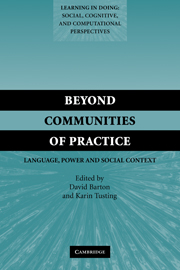Book contents
- Frontmatter
- Contents
- List of Contributors
- Series Foreword
- Introduction
- 1 Literacy, reification and the dynamics of social interaction
- 2 Language and power in communities of practice
- 3 Mediating allegations of racism in a multiethnic London school: what speech communities and communities of practice can tell us about discourse and power
- 4 “I've picked some up from a colleague”: language, sharing and communities of practice in an institutional setting
- 5 The person in the doing: negotiating the experience of self
- 6 Communities of practice and learning communities: do bilingual co-workers learn in community?
- 7 Moving beyond communities of practice in adult basic education
- 8 ‘Communities of practice’ in higher education: useful heuristic or educational model?
- 9 Communities of practice, risk and Sellafield
- 10 Semiotic social spaces and affinity spaces: from The Age of Mythology to today's schools
- Author Index
- Subject Index
- LEARNING IN DOING
- References
7 - Moving beyond communities of practice in adult basic education
Published online by Cambridge University Press: 24 November 2009
- Frontmatter
- Contents
- List of Contributors
- Series Foreword
- Introduction
- 1 Literacy, reification and the dynamics of social interaction
- 2 Language and power in communities of practice
- 3 Mediating allegations of racism in a multiethnic London school: what speech communities and communities of practice can tell us about discourse and power
- 4 “I've picked some up from a colleague”: language, sharing and communities of practice in an institutional setting
- 5 The person in the doing: negotiating the experience of self
- 6 Communities of practice and learning communities: do bilingual co-workers learn in community?
- 7 Moving beyond communities of practice in adult basic education
- 8 ‘Communities of practice’ in higher education: useful heuristic or educational model?
- 9 Communities of practice, risk and Sellafield
- 10 Semiotic social spaces and affinity spaces: from The Age of Mythology to today's schools
- Author Index
- Subject Index
- LEARNING IN DOING
- References
Summary
This chapter draws on our experience as adult basic educators to reflect on learning in communities of practice. We discuss the issues of marginality, peripherality, legitimacy, boundaries and identity encountered in our attempts to foster communities of practice in a series of innovative adult literacy and numeracy courses using information and communication technologies (ICT). In order to frame the concerns that underpin this discussion, the chapter begins with a brief overview of the recent history of adult basic education (ABE) in Britain and introduces the setting within which the courses have been developed, an ABE Open Learning Centre in the valleys of post-industrial south Wales. We describe how, in 1997, the installation of a network of computers with Internet access at the centre highlighted problems with existing procedures, training and resources, necessitating a search for new ways to integrate ICT into teaching and learning practice. In collaboration with staff, learners and volunteers, we gradually developed an approach based on fostering communities of technology-based practice through pair and group work on digital media projects. While this approach has brought many positive outcomes, and is now integral to most technology-based provision at the centre, we have also discovered contradictions between the way participation and learning are played out in communities of practice and the fundamental aims and concerns of ABE. The closing sections of the chapter reflect on those contradictions, which are now encouraging us to seek ways of moving beyond the communities of practice approach in ABE.
Information
- Type
- Chapter
- Information
- Beyond Communities of PracticeLanguage Power and Social Context, pp. 158 - 179Publisher: Cambridge University PressPrint publication year: 2005
References
Accessibility standard: Unknown
Why this information is here
This section outlines the accessibility features of this content - including support for screen readers, full keyboard navigation and high-contrast display options. This may not be relevant for you.Accessibility Information
- 17
- Cited by
